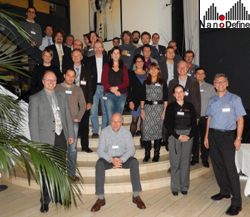Dec 13 2013
A 29-partner consortium of top European RTD performers, metrology institutes, and nanomaterials and instrument manufacturers, gathered at a launch meeting in Wageningen, NL, last month to begin the mobilisation of the critical mass of expertise required to establish the measurement tools and scientific data that help to implement the EU recommendation on the definition of a nanomaterial.
 NanoDefine partners at the launch meeting, Wageningen, NL . Image Credit: RIKILT (NL).
NanoDefine partners at the launch meeting, Wageningen, NL . Image Credit: RIKILT (NL).
We have come a long way in exploring the full potential of nano as a key enabling technology, yet, there are still uncertainties surrounding environment, health and safety (EHS) issues and the questions that need to be addressed: what is or isn’t a nanomaterial. One challenge consists in the development of methods that reliably identify, characterize and measure nanomaterials (NM) both as substance and in various products and matrices. In responses, the European Commission has recently recommended a definition of NM as a reference to determine this (2011/696/EU).
The NanoDefine project will explicitly address this question over the next four years.
Based on a comprehensive evaluation of existing methodologies and a rigorous intra-lab and inter-lab comparison, validated measurement methods and instruments will be developed that are robust, readily implementable, cost-effective and capable to reliably measure the size of particles in the range of 1 - 100 nm, with different shapes, coatings and for the widest possible range of materials, in various complex media and products. Practical case studies will assess their applicability for various sectors, including food/feed, cosmetics etc.
One major outcome of the project will be the establishment of an integrated tiered approach including validated rapid screening methods (tier 1) and validated in depth methods (tier 2), with a user manual to guide end-users, such as manufacturers, regulatory bodies and contract laboratories, to implement the developed methodology.
NanoDefine will closely collaborate with its sister projects in the NanoSafety Cluster (www.nanosafetycluster.eu) as well as engage with international EHS, RTD and metrology initiatives. NanoDefine will also be strongly linked to main standardization bodies, such as CEN, ISO and OECD, by actively participating in Technical Commissions and Working Groups, and by proposing specific ISO/CEN work items, to integrate the developed and validated methodology into the current standardization work.
Source: http://www.nano.org.uk/